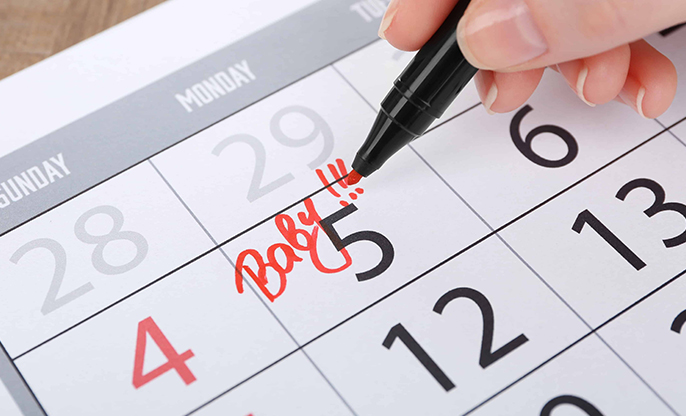
Cracking the Code: Understanding Due Dates and Their Mysteries
Ah, due dates – those elusive markers on the calendar that hold the promise of meeting your little one for the first time. But what exactly do they mean, and how are they calculated? Join us as we embark on a journey to decode the enigma of due dates and shed light on their significance in the world of pregnancy and childbirth.
First things first, let's talk about estimated due dates (EDDs) and how they're determined. Most healthcare providers calculate your due date based on the Nagele rule, which involves counting 40 weeks (or 280 days) from the first day of your last menstrual period (LMP). While this method provides a rough estimate of when your baby is likely to arrive, it's important to remember that only about 5% of babies are born on their due dates. So, consider your due date more of a ballpark figure than an exact science.
Now, let's address some common assumptions about due dates. Contrary to popular belief, due dates are not set in stone, and they certainly don't come with an expiration date. Your baby will come when they're ready, and that might be a few days before or after your EDD. Instead of fixating on a specific date, focus on being prepared for your baby's arrival whenever it may happen.
Speaking of readiness, let's talk about how your baby's readiness plays a crucial role in determining when labour will begin. While your due date marks the end of 40 weeks of pregnancy, your baby's lungs, brain, and other vital organs may still be maturing in the womb. Some babies need a little extra time to get ready for their grand entrance, while others are eager to meet the world ahead of schedule. Trust in your body's innate wisdom and your baby's natural instincts – they know when the time is right.
Now, let's take a trip down memory lane and explore how due dates were handled in your family of origin. Did your ancestors rely on ancient wisdom and cultural traditions to predict the arrival of their little ones, or did they embrace the element of surprise? Reflecting on your family's birthing practices can offer insights into your own beliefs and expectations surrounding due dates.
In conclusion, due dates may be shrouded in mystery, but they serve as a helpful guidepost on your pregnancy journey. Remember to approach your due date with flexibility and an open mind, and trust in the natural rhythms of your body and your baby. After all, the best things in life are worth waiting for – whenever they may arrive.
More in Labour & Birth

Release Of Membranes
5 Min Read

Informed choice and consent
1 Min Read

When To Go To The Hospital
3 Min Read

What Is Labour?
3 Min Read

What Exercise Help In Labour?
3 Min Read

Partner's Role
4 Min Read

Pre-Labour Signs
5 Min Read

How Labour Begins
4 Min Read

What Are Contractions
4 Min Read

Timing The Contractions
3 Min Read

Stages Of Labour
7 Min Read

Coming together after a C section
1 Min Read

Sequence of Breast Crawl
1 Min Read

What is Golden Hour?
6 Min Read

Golden hour after Birth
1 Min Read

Encoded Safety / Threat System
1 Min Read

Transitions The Baby Needs to Make
1 Min Read

Natural Expulsion Reflex
11 Min Read

Birthing Stage
1 Min Read

Intro
1 Min Read

Using BRAINS to Make Decisions
3 Min Read

Benefits of Knowing Your Birth Plan
4 Min Read

Why Do You Need a Birth Plan?
1 Min Read

Why do you need a Birth plan?
6 Min Read

Care For The Baby
1 Min Read

Cesarean Birth
1 Min Read

Interventions At Birth
1 Min Read

Pain Management
1 Min Read

Managing And Monitoring
1 Min Read

Why And Wherefore Of Interventions
1 Min Read

TRAIGE
1 Min Read

Differentiating Medical Interventions
1 Min Read

Considerations While Choosing a Doctor
1 Min Read

Birthing In a Hospital
1 Min Read

Intro
1 Min Read

Scenario for Active Labour
1 Min Read

What Would You Choose
1 Min Read

Tips That Help In Labour
1 Min Read

Birth And Arriving Of The Baby
1 Min Read

Strategies For Transition
1 Min Read

Supporting With A Rebozo
1 Min Read

Acupressure Points
1 Min Read

Touch And Massage
1 Min Read

Birthball
1 Min Read

Movement
1 Min Read

Positions In Labour
1 Min Read

Breathing
1 Min Read

Comfort Measures During Active labour
4 Min Read

Coping Strategies For Active Labour
1 Min Read

Coping Strategies For Early Labour
1 Min Read

Intro
1 Min Read

Navigating The Waves
4 Min Read

Lets Talk About Pain
1 Min Read

Key Elements
1 Min Read

Stages Of Labour
7 Min Read

Labour Land
1 Min Read

Hallmarks Of Progress
1 Min Read

Timing The Contractions
4 Min Read

Release of Membranes
5 Min Read

Contractions
4 Min Read

How Labour Begins
1 Min Read

Prelabour Signs
7 Min Read

Getting Ready For Birth
1 Min Read

Due Date And Actual Birth Day
1 Min Read

